As the largest academic centre of speech and language technology in South Asia, the Language Technology Research Centre at IIIT-H carries out pioneering work in the areas of natural language processing, computational linguistics, speech processing, information retrieval through four specialized labs, whose works complement each other. In the area of natural language processing, there is a leading conference titled Empirical Methods in Natural Language Processing (EMNLP) organized by the Association for Computational Linguistics (ACL), a special interest group on linguistic data (SIGDAT). At the recently concluded EMNLP-2018 conference at Brussels, Belgium, there were three paper presentations from students out of LTRC. Here’s a brief look at students’ research that has resulted in these outstanding papers.
Automating Science Journalism
While breakthroughs are constantly taking place in the realms of Science, Technology and Engineering, unless scientific jargon is demystified, it lies outside the purview of the common man. Final year dual degree student Raghuram Vadapalli’s area of research focus is on automating science journalism. He says that typically journalists responsible for talking with researchers and penning a simplistic version that common folk can understand. Terming this as a tedious process, he says, “We wanted to automate this by using Deep Learning. So we created an algorithm which can read a research paper and write a news article or a blog about it.”A paper on the initial experiments conducted in this field was presented originally at the 27th ACM International Conference on Information and Knowledge Management (CIKM) 2018 in Turin, Italy in October last year. In Belgium, at the EMNLP 2018 in November, an interactive demo of the system, aptly titled “When Science Journalism Meets Artificial Intelligence” was presented.
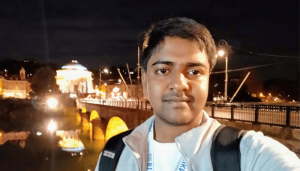
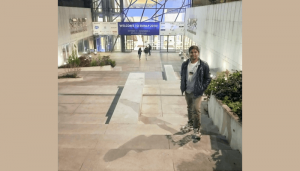
Answer The Question
Drawing a blank instead of the answer you had at the tip of your tongue? Thanks to all-pervasive internet connectivity on the smartphone or otherwise, the right answers are never too far behind. However, all too often, a simple search on a search engine throws up dozens of search results rather than a definitive answer. Final year dual degree student affiliated with the Machine Translation and NLP lab, Vishal Gupta who is pursuing masters research under the guidance of Prof. Manish Shrivastava and Dr. Manoj Chinnakotla(Microsoft) seems to have found a solution. Vishal says, “As more people access the web from mobile devices on the move, the need for software that can interpret and answer questions becomes more important. Thus, it’s become important to have natural and declarative access to information, especially as voice assistants like Google, Apple gain more prominence.” His paper titled, “Retrieve and Re-rank: A Simple and Effective IR Approach to Simple Question Answering over Knowledge Graphs” focuses on answering such “simple” questions given millions of facts in the form of Subject, Relation, Object. Take for example: India, Prime Minister, Narendra Modi. The uniqueness of this approach lies in its simplicity as well as greater accuracy (as compared to other existing solutions).
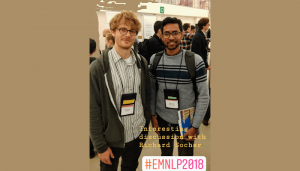
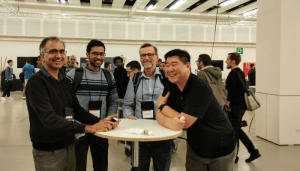
Algorithms To Spot Bullying
Cyberbullying is a form of persistent harassment that takes place in the digital world through texts, emails, posts, comments on websites and so on. 24-year-old Vinay Singh’s work aims to automatically detect such aggressive online behaviour. While most of the work in this area has traditionally been done in English, Vinay along with his colleagues at LTRC chose to focus on Hindi-English Code-Mixed texts typically used by Indians on Facebook posts and comments. They used machine learning algorithms to classify such text as aggressive or not.
Vinay, also a final year dual-degree student at LTRC, working under the guidance of Dr. Manish Srivastava presented his findings at EMNLP 2018 in his paper titled ‘Aggression Detection on Social Media Text Using Deep Neural Networks’. Acknowledging that his model was limited to Facebook, Vinay says that they would like to choose a greater variety of social media text that could be considered as offensive/aggressive/hate speech to make their predictions and results more significant.
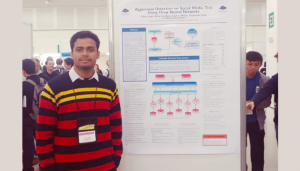
Experiences
All the three students who presented their papers at EMNLP 2018 are recipients of the Microsoft Research Travel Grant. While thanking Microsoft and their advisors for the opportunity to attend the conference, they unanimously stated that they had read numerous papers from people across the globe and finally had the chance to meet them in person. For Vishal Gupta, the highlight of the conference was not just having a discussion with Richard Socher, founder of AI startup, Metamind, but when an author came to his poster and mentioned that one of the baselines mentioned was his research work! Terming it as one of his best academic experiences so far, Vinay Singh says, “The best part about the presentation was, I saw so many people and companies like Facebook, Microsoft, Amazon, Google, and so on showing interest in my work with queries as to how can we take this further to work on other languages”. For Raghuram Vadapalli, attending two world-class conferences has been immensely motivating to learn about advances in the field and how those advances are making a real impact in the society. “Works presented at the conference ranged from predicting mental depression from tweets, crime from social media to analyzing how news moves the markets. In fact, attending these conferences has further inspired me towards a career as a researcher,” he remarks.

Sarita Chebbi is a compulsive early riser. Devourer of all news. Kettlebell enthusiast. Nit-picker of the written word especially when it’s not her own.

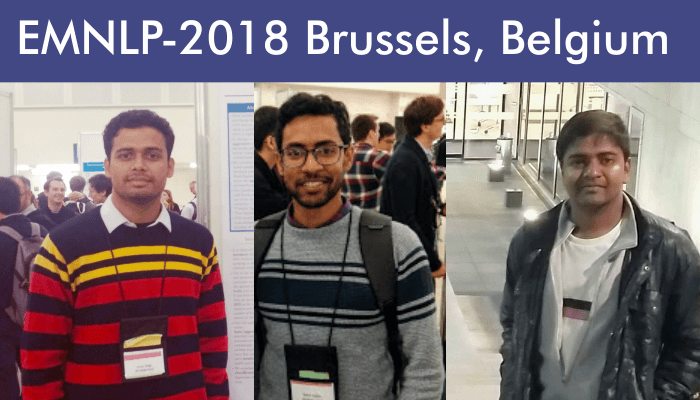
Next post